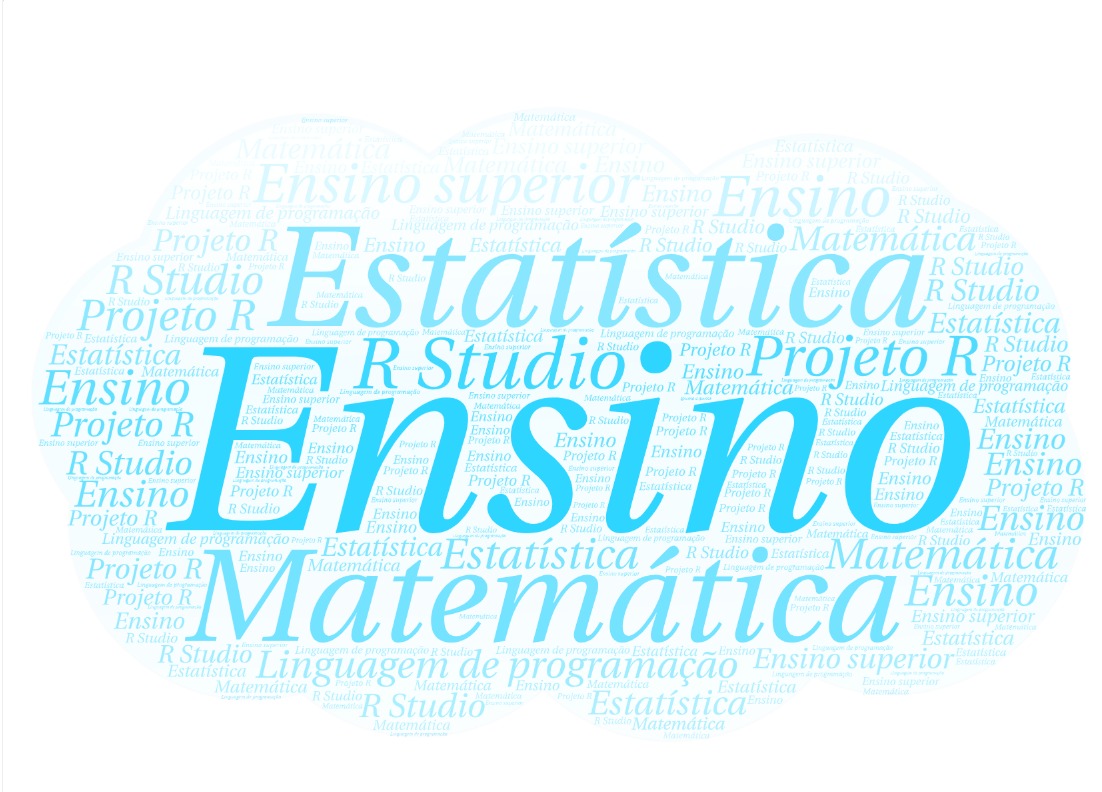A study on the acceptance of the use of the R language in Mathematics and Statistics disciplines
Keywords:
Statistical education, Mathematical education, Programming language, Applied statisticsAbstract
R language is an open-source programming that allows, in addition to statistical procedures, simple mathematical operations, manipulation of vectors and matrices, among other procedures. Due to these characteristics, R has been used as support to disciplines of Mathematics and Statistics from Centro de Ciências Agrárias of Universidade Federal de São Carlos, such in “Computer Basics and Coding”, “Mathematical Topics II” and “Probability and Statistical Notions”, offered for the courses of Biotechnology and Agronomic Engineering in Center. The intention of using R is that students understand better the subjects taught in classes. In this way, the aim of this work was to evaluate the acceptance of the students of the mentioned disciplines about the use of R programming language during the classes. The research utilized exploratory descriptive methods with the help of R to analyze acceptance of the students about the use of this language, by analyzing the answers of a satisfaction questionnaire that the students answered after the conclusion of each discipline. The approval rates of R usage among classes were 100% in Computer Basics and Coding; 78% in Mathematical Topics II, and 95% in Probability and Statistical Notions, which shows that R utilization, for these disciplines, makes a reliable and promising resource to help the learning and teaching process.
References
AHO, K. asbio: A Collection of Statistical Tools for Biologists. R package version 1.8-3. 2022. Disponível em: https://CRAN.R-project.org/package=asbio.
ALMEIDA, W.Q. Dificuldades dos alunos no aprendizado de Cálculo Diferencial e Integral I: uma reflexão. Monografia (Especialização em Matemática para professores) – Universidade Federal de Minas Gerais, Belo Horizonte, 2016.
BARROS, J.V.; PACHECO, J.A.D. O uso de softwares educativos no ensino de matemática. Revista de Estudos Culturais e da Contemporaneidade, n.8, p.5-13, 2013.
BLASS, L.; GOERGEN, G.; IRALA, V.B. Análise das percepções e desempenhos discentes com a utilização do software R em uma disciplina de graduação de natureza multicurso. Revista Prática Docente, v.5, n.3, p.1568-1592, 2020.
CARBONNELLE, P. PYPL - Popularity of Programming Language Index. Disponível em: https://pypl.github.io/PYPL.html. Acesso em: 19 jan. 2023.
CARDOSO, M.G. Ensino de Estatística: o estudo de conceitos potencializado pelo software Rstudio. 2019. Dissertação (Mestrado) - Curso de Matemática, Universidade Tecnológica Federal do Paraná, Londrina, 2019.
CRAWLEY, M.J. The R book. 2.ed. Wiley, 2012. 1080p.
DALL’AGNOL, R.W.; BETZEK, N.M.; BAZZI, C.L. Aplicação do software R para análise geoestatística, interpolação de dados por krigagem ordinária e geração de mapas temáticos de produtividade agrícola. Revista de Computação aplicada ao Agronegócio, v.1, n.1, p.24-37, 2018.
EASTWOOD, B. The 10 Most Popular Programming Languages to Learn in 2021. Disponível em: https://www.northeastern.edu/graduate/blog/most-popular-programming-languages/. Acesso em: 19 jan. 2023.
GIORGI, F.M.; CERAOLO, C.; MERCATELLI, D. The R Language: An Engine for Bioinformatics and Data Science. Life, v.12, n.5, p.648, 2022.
GLADCHEFF, A.P.; SILVA, D.M.; ZUFFI, E.M. Um instrumento para avaliação da qualidade de softwares educacionais de matemática para o ensino fundamental. In: Congresso da Sociedade Brasileira de Computação, 2001. Fortaleza. Anais [...] Fortaleza: VII Workshop de Informática na Escola, 2001. p.1-12.
PASSOS, I.C. Análise de dados qualitativos com o R: uma introdução ao pacote RQDA. Inter-Legere, v.4, n.30, p.1-19, 2021.
R CORE TEAM (2021). R: A language and environment for statistical computing. R Foundation for Statistical Computing, Vienna, Austria. Disponível em: https://www.R-project.org.
R STUDIO TEAM (2020). RStudio: Integrated Development for R. RStudio, PBC, Boston, MA. Disponível em: http://www.rstudio.com/.
ROSA, O.; RODRIGUES, C.; SILVA, P. Aspectos Motivacionais na Disciplina de Cálculo Diferencial e Integral. Revista Eletrônica TECCEN, v.4, n.2, p.49-62, 2011.
SILVA, J.B.; ANDRADE, M.H.; OLIVEIRA, R.R.; SALES, G.L.; ALVES, F.R.V. Tecnologias digitais e metodologias ativas na escola: o contributo do Kahoot para gamificar a sala de aula. Revista Thema, v.15, n.2, p.780-791, 2018.
VENTURA, J.P.C.; GOMES, C.R. Softwares no ensino de matemática: um olhar sobre a BNCC. Boletim Cearense de Educação e História da Matemática, v.8, n.23, p.846-860, 2021.
WUERTZ, D.; TOBIAS, S.; YOHAN, C.; MARTIN, M. fBasics: Rmetrics - Markets and Basic Statistics. Rpackage version 4021.93. 2022. Disponível em: https://cran.r-project.org/web/packages/fBasics/index.html.

Downloads
Published
How to Cite
Issue
Section
License
Proposta de Política para Periódicos de Acesso Livre
Autores que publicam nesta revista concordam com os seguintes termos:
- Autores mantém os direitos autorais e concedem à revista o direito de primeira publicação, com o trabalho simultaneamente licenciado sob a Licença Creative Commons Attribution que permite o compartilhamento do trabalho com reconhecimento da autoria e publicação inicial nesta revista.
- Autores têm autorização para assumir contratos adicionais separadamente, para distribuição não-exclusiva da versão do trabalho publicada nesta revista (ex.: publicar em repositório institucional ou como capítulo de livro), com reconhecimento de autoria e publicação inicial nesta revista.
- Autores têm permissão e são estimulados a publicar e distribuir seu trabalho online (ex.: em repositórios institucionais ou na sua página pessoal) a qualquer ponto antes ou durante o processo editorial, já que isso pode gerar alterações produtivas, bem como aumentar o impacto e a citação do trabalho publicado (Veja O Efeito do Acesso Livre).



